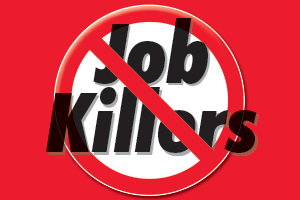 A California Chamber of Commerce job killer bill that will increase the cost to transport goods and incentivize frivolous litigation is scheduled to be considered by the Assembly Local Government Committee on Wednesday.
A California Chamber of Commerce job killer bill that will increase the cost to transport goods and incentivize frivolous litigation is scheduled to be considered by the Assembly Local Government Committee on Wednesday.
The bill, AB 1000 (Reyes; D-San Bernardino), mandates a statewide setback of 1,000 feet from sensitive receptors (housing, schools, parks, hospitals, jails, etc.) for all new or expanded logistics use facilities, regardless of environmental impacts, establishing a de facto ban. The bill also creates a new private right of action in California.
AB 1000 is the third attempt in three years proposing a statewide setback of 1,000 feet from “sensitive receptors” for all new or expanded logistics use facilities 100,000 square feet or larger in California. Like all prior versions, AB 1000 relies on outdated information that will in effect create a statewide de facto ban on warehouses throughout California.
Eliminates Good Paying Jobs
In a letter submitted to legislators last week, the CalChamber warned that AB 1000’s de facto ban on logistics use facilities will undermine California’s ability to remain competitive, especially as the state already struggles to find adequate off-docking facilities to move goods from the port.
Ramped up competition from Canadian and Mexican ports, as well as other seaports in the U.S. and abroad, are challenging California’s position as the international trade leader of the nation and taking jobs out of California, the CalChamber said.
More and more cargo once bound for California heads instead to places like Virginia, Georgia, New York or Texas, and AB 1000 threatens more than one out of seven Southern California jobs tied to logistics.
“The loss of California’s market share means the permanent loss of these high-quality logistics jobs that stretch from California ports to the boundaries of the state,” the CalChamber warned. “AB 1000 will exacerbate these job losses and threaten the very heart of California’s economic competitiveness, eliminating jobs and tax revenues, and increasing costs for Californians as goods become harder and more expensive to move.”
Creates a New Private Right of Action
Another concerning aspect of AB 1000 is that it creates a brand-new private right of action in the state under section 5098.9.
With an ignoble track record of unintended consequences and increased frivolous litigation, California should avoid creating another law providing plaintiff’s attorneys with an additional avenue to “act” as the Attorney General and sue project applicants in order to enrich themselves, slow projects and drive-up development costs, the CalChamber said.
Prevents Construction of Certain Housing
The CalChamber also pointed out that AB 1000 will decrease the amount of new housing constructed in California at a time when the state still faces an affordability crisis.
Median home prices in the Golden State still exceed $800,000, even with interest rates twice as high as they were last year. AB 1000 essentially eliminates the ability to locate housing near job sites, which will stymie mixed-use development projects from moving forward. For example, the District at Jurupa Valley project proposes the development of up to 1,192 residential units and seven acres of open space and parks alongside commercial, retail and logistics use facilities. The housing associated with the Jurupa Valley project is feasible only because of the underlying infrastructure that the commercial, logistics uses and retail bring.
Additionally, these land uses buffer the residential housing from the 60 Freeway and drastically reduce vehicle miles traveled, consistent with California’s climate change goals. If AB 1000 were law, these projects would never come to fruition, which is why this bill is labeled a “Housing Killer” by the California Building Industry Association.
Staff Contact: Adam Regele


